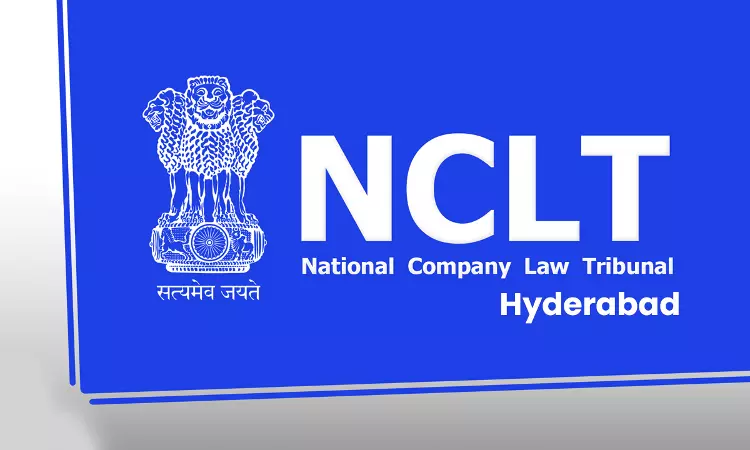Demand Notice Sent To Wrong Address Invalidates Insolvency Petition: NCLT Hyderabad
LIVELAW NEWS NETWORK
27 May 2025 9:30 PM IST
The National Company Law Tribunal Hyderabad Bench of Shri. Rajeev Bhardwaj (Judicial Member) and Shri Sanjay Puri (Technical Member) dismissed a petition filed under Section 9 of the Insolvency & Bankruptcy code (“the Code”), holding that if demand notice u/s 8 of the code is not sent to the correct address, it does not meet the mandatory requirements of...
The National Company Law Tribunal Hyderabad Bench of Shri. Rajeev Bhardwaj (Judicial Member) and Shri Sanjay Puri (Technical Member) dismissed a petition filed under Section 9 of the Insolvency & Bankruptcy code (“the Code”), holding that if demand notice u/s 8 of the code is not sent to the correct address, it does not meet the mandatory requirements of law.
Background Facts:
M/s Anurada Chemicals (“Operational Creditor”) is a chemical manufacturing company primarily engaged in the production of basic chemicals, excluding fertilizers and nitrogen compounds. On the other hand M/s. Synaptics Labs Private Limited (“Corporate Debtor”) operates in the field of manufacturing Active Pharmaceutical Ingredients and other related products.
The Operational Creditor supplied chemicals to the Corporate Debtor. However, the Corporate Debtor failed to make payments for the same. In an attempt to settle the dues, the Corporate Debtor issued two post-dated cheques to the Operational Creditor, both of which were subsequently dishonoured.
Thereafter, the Operational Creditor sent a confirmation of Accounts for the relevant period, reflecting an outstanding balance of Rs.1,32,97,094/- and the Corporate Debtor acknowledged the payment of outstanding amount.
Subsequently, the Operational Creditor issued a demand notice u/s 8 to the Corporate Debtor as it had still not made the payment. The notice was duly delivered, but no reply was received from the Corporate Debtor.
Owing to the non-payment even after service of the statutory demand notice, the Operational Creditor filed the petition u/s 9 of the code seeking initiation of Insolvency Proceedings against the Corporate Debtor.
Findings:
The Tribunal observed that the purchase orders issued by the Corporate Debtor, the tax invoices raised by the Operational Creditor, and the accompanying e-way bills substantiated the existence of a contractual relationship and the performance of obligations by the Operational Creditor.
These documents clearly established that goods had been supplied, and payment remained outstanding, thus constituting an “operational debt” as defined under Section 5(21) of the Code.
However, the Tribunal remarked that merely proving the existence of a debt and default is not sufficient to initiate insolvency proceedings under Section 9 of the Code. In Shailendra Sharma v. Ercon Composites (2021), NCLAT held that Service of Demand Notice to the Corporate Debtor under Section 8 is a mandatory requirement.
The Tribunal held that Section 8(1) requires that a demand notice be properly delivered to the Corporate Debtor before filing a petition under Section 9 of the Code. In this case, although the Operational Creditor attempted service via registered post and email, the notice was sent to an incorrect address and the pin code mentioned was inaccurate. This discrepancy cast doubt on the validity of the service.
In Shri Bijay Pratap Singh v. Unimax International, 2020 NCLAT, held that if notice is not sent to the correct address, it does not meet the mandatory requirements of law. The discrepancy in the pin code casts doubt on proper service of the notice.
The Tribunal observed that even though the Operational Creditor has claimed to have served the Demand Notice by email, there is no material on record to demonstrate that the email was sent specifically to a whole-time director, designated partner, or key managerial personnel of the Corporate Debtor, as required under Rule 5(2)(b) of the Insolvency and Bankruptcy Rules, 2016. Nor was there any evidence to establish that the email was actually received.
The Tribunal also pointed out that Section 9(3)(a) mandates filing a copy of the delivered demand notice along with the petition. In the present case, no such copy was provided. This omission directly impacts the maintainability of the petition. Under Section 9(5)(ii)(c) of the Code, a petition must be rejected if the Operational Creditor fails to deliver the invoice or demand notice to the Corporate Debtor.
The Tribunal concluded that although the Operational Creditor successfully established the existence of an operational debt and a default exceeding the prescribed threshold, the mandatory requirement of valid service of the demand notice under Section 8(1) was not satisfied.
The notice was neither sent to the correct registered address nor was valid service of email was established. Accordingly, the petition dismissed the Section 9 petition.
Case Title: Anurada Chemicals v/s Synaptics Labs Pvt. Ltd.
Case Number: Company Petition IB/134/9/2024
Judgment Date: 02/05/2025
For the Petitioner: Mr.Y.Suryanarayana, Advocate



